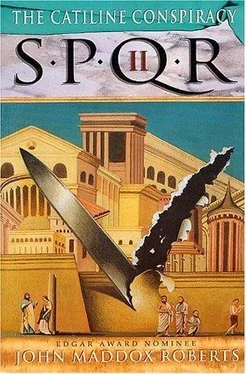John Roberts - The Catiline Conspiracy
Здесь есть возможность читать онлайн «John Roberts - The Catiline Conspiracy» весь текст электронной книги совершенно бесплатно (целиком полную версию без сокращений). В некоторых случаях можно слушать аудио, скачать через торрент в формате fb2 и присутствует краткое содержание. Жанр: Исторический детектив, на английском языке. Описание произведения, (предисловие) а так же отзывы посетителей доступны на портале библиотеки ЛибКат.
- Название:The Catiline Conspiracy
- Автор:
- Жанр:
- Год:неизвестен
- ISBN:нет данных
- Рейтинг книги:3 / 5. Голосов: 1
-
Избранное:Добавить в избранное
- Отзывы:
-
Ваша оценка:
- 60
- 1
- 2
- 3
- 4
- 5
The Catiline Conspiracy: краткое содержание, описание и аннотация
Предлагаем к чтению аннотацию, описание, краткое содержание или предисловие (зависит от того, что написал сам автор книги «The Catiline Conspiracy»). Если вы не нашли необходимую информацию о книге — напишите в комментариях, мы постараемся отыскать её.
The Catiline Conspiracy — читать онлайн бесплатно полную книгу (весь текст) целиком
Ниже представлен текст книги, разбитый по страницам. Система сохранения места последней прочитанной страницы, позволяет с удобством читать онлайн бесплатно книгу «The Catiline Conspiracy», без необходимости каждый раз заново искать на чём Вы остановились. Поставьте закладку, и сможете в любой момент перейти на страницу, на которой закончили чтение.
Интервал:
Закладка:
My improved mood even lightened my fears about Aurelia. If she was being used by Catilina as bait, surely it was not through her own connivance. Surely, I thought, she could not be a part of the conspiracy. Catilina and his men were not the only self-deluded fools in Rome that day.
The next days were filled with elation and anxiety. There were no more meetings with the conspirators, although from time to time I would encounter one or more of them in the Forum or at the baths, at which times they could not help giving me adolescent signs of complicity, as if we were fellow initiates of one of the mystery cults.
I sought excuses to call on Aurelia, but the slaves at Orestilla's house told me that both ladies were away, although they were vague about the destination and duration of this absence. Naturally enough, once I was cut off from contact with Aurelia, I was able to think of nothing else. Memories of our night together ran through my mind like the most salacious of those mimes frowned upon by the Censors, each fantasy more heated and fevered than the last.
I neglected my duties at the treasury, but the slaves and freedmen there took no notice, since I customarily neglected them at the best of times. Dinner companions noticed my fidgeting and abstraction and plied me, successfully, with wine. It may be taken as a matter for wonder that a man embroiled in an incredibly dangerous mesh of intrigue, treachery and murder should be distracted by the charms of one young woman, however voluptuous. It is simply that young men are like that. I was, at any rate. The Greeks and Trojans once fought a war over a woman, so I was not alone in this fixation, although there seemed to be something un-Roman about it.
The day of the gathering of the Caecilii arrived, and with the others I crossed the river and climbed the Janiculum to the expansive villa where Quintus Caecilius Metellus Creticus awaited permission to celebrate his triumph. Every great family has one or 'more of these yearly gatherings, where special family rites are observed, marriages are arranged and decisions concerning the whole gens are made.
Of course, not every Roman bearing the name Caecilius attended, for then several thousand persons would have had to crowd into the villa. Every paterfamilias who was not on foreign military service was there, and their adult male offspring. These would pass on the decisions and celebrate the rites at home for their own Caecilian freedmen and clients.
The villa and its grounds were cluttered with the loot of Crete, kept there in anticipation of the coming triumph and guarded by hard-eyed veterans of Creticus's legions. I was glad to see that there were so many of them, since they would be needed soon.
Among those present were my father, the Praetor Metellus Celer, the pontifex and Caecilian by adoption Metellus Pius Scipio, and Pompey's legatus Metellus Nepos. I feared that my major problem would be finding a few minutes to speak privately with Creticus.
After the opening invocation of the gods, the genius of the family and the lares and penates of the house, the serious business of the meeting began. Among the questions brought up was, of all things, my name. Some of the older and more traditional members of the family wanted the name Decius banned from future generations. Decius, they said, was not properly a praenomen at all, but a nomen. My father argued, eloquently, that a name decreed by a god must be deemed just and fitting and we had won the fight with the Samnites the next day and so Decius must be a fitting praenomen for gens Caecilii. The anti-Decian faction were not impressed. Apparently, they thought that the family simply could not have enough Quintuses. I think this gives some indication of how slack and complacent all of Rome had become during the easy years. Never once was the family's political stand brought up. The business about my name was never decided, and remains undecided to this day.
After the rites and business were taken care of, Creticus entertained us at a splendid banquet where we drank nothing but the very best Cretan wines. Creticus was an undistinguished, mild-looking man. He had been an easygoing, plodding politician and had eventually worked his way up the ladder until he won the office of Consul, which he held with Quintus Hortensius Hortalus, my father's patron. As his proconsular command, he had been given the war against Crete and the pirates based there. He was as undistinguished a general as he had been a politician, and fought a long, desultory campaign. But then, unexpectedly, he displayed courage and stubbornness when Pompey, as was his wont, tried to usurp his command when the campaign was all but over.
Pompey's supporter, the tribune Gabinius, had passed a law giving Crete to Pompey. A number of the Cretan cities, knowing that the war was lost, hastened to surrender to Pompey. Everyone was in the habit of surrendering to Pompey at that time, while surrendering to a third-rate general like Metellus Creticus would be a disgrace. Metellus had refused to recognize Pompey's right to accept their surrenders and threatened to attack Pompey's officers. For a while, it almost looked as if civil war would break out, but Pompey backed down. The next year the tribune Manilius passed a law giving Pompey command of the entire Mediterranean in order to crush the pirates, but by that time Creticus had Crete conquered and reorganized as a province. Pompey still held a grudge and his flunkies resisted Creticus's right to celebrate a triumph.
In justice to Pompey, I must say that his campaign against the pirates was brilliant, crushing them completely and almost without bloodshed. It was a masterpiece of organization rather than tactics, and causes me to believe that had Pompey concentrated on administration rather than conquest he might have been one of Rome's great benefactors, instead of being a mere military adventurer, who plunged the Republic into the most destructive of its civil wars.
I finally managed to get Creticus aside after the banquet. Many of the family had already gone home, and the rest of us were walking our dinner off in the formal gardens or admiring the loot from Crete. Crete is not Asia, and Creticus had brought back no such treasure as had Lucullus, but the pirate strongholds had yielded some respectable loot and the cities had possessed some very fine Greek statues, which he had appropriated. His proudest display was a trophy in the form of a Cretan column, studded with the bronze rams of pirate galleys. He had a slave who did nothing all day except polish the bronze.
I found Creticus on the broad portico of his house overlooking the gardens. I made one of those half-unconscious gestures that indicates a desire for a private audience. I had decided that I would arouse no suspicion thereby. Everyone would just assume that I was hitting him up for a loan.
"Good to see you, Decius," he said. "I am happy that your father stood up to those idiots on the matter of your name. Have you any idea what it was like, growing up in this family with the name Quintus? At a family gathering like this, somebody yells 'Quintus!' and three quarters of the males turn to see who is calling them."
"I never thought of it that way," I admitted. "Actually, sir, I am here to speak with you on behalf of the Consul Cicero. It's a matter of urgent danger to the state."
He was understandably startled. "Speak on."
Very briefly, I sketched the conspiracy for him, and Cicero's instructions to him. His expression went from incredulity to concern to calculation. I knew exactly what he was calculating: how long would it take Pompey to reach Rome once he had word?
"Sergius Catilina planning a coup?" He gave a laugh that was half snort. "The man's an embarrassment to the Republican system. It was presumptuous enough that he dared to stand for election as Consul, but this! Mark me, Decius, someone else is behind this, and I suspect Pompey."
Читать дальшеИнтервал:
Закладка:
Похожие книги на «The Catiline Conspiracy»
Представляем Вашему вниманию похожие книги на «The Catiline Conspiracy» списком для выбора. Мы отобрали схожую по названию и смыслу литературу в надежде предоставить читателям больше вариантов отыскать новые, интересные, ещё непрочитанные произведения.
Обсуждение, отзывы о книге «The Catiline Conspiracy» и просто собственные мнения читателей. Оставьте ваши комментарии, напишите, что Вы думаете о произведении, его смысле или главных героях. Укажите что конкретно понравилось, а что нет, и почему Вы так считаете.










